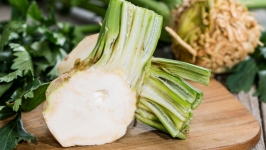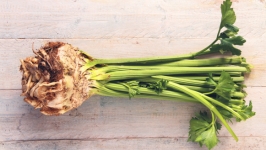Organic Farmers United: Coke Farm Helps Bring Certified Growers’ Produce to Market
You could easily drive by Coke Farm headquarters, just 14 miles south of Gilroy near the small town of San Juan Bautista, and not realize that it’s an organic food hub vitally important to area organic growers and the region’s overall economy and health. For Coke Farm isn’t just a farm in its own right, though it is that as well. It’s a place where over 50 organic growers within a 150-mile radius bring their produce to have it sold to distributors, large and small, who help it end up on restaurant plates or in grocery stores as far away as the East Coast and Canada.
It all started with Dale Coke. He began growing strawberries in 1980, and the next year he went certified organic. In fact, Coke Farm’s CCOF (California Certified Organic Farmers) certification was number 001.
From the 1980s, Coke Farm went from a singular organic grower to now holding the combined roles of grower, shipper, sales, national distributor and broker for small to medium-sized organic farms.
“Growing, and taking care of the farm, and taking care of certification paperwork, and going and selling, it’s a huge job,” says Christine Cattin Coke, co-owner and COO of Coke Farm. “Growers are able to bring their produce to market through us, which could otherwise be difficult for them.”
Some of the growers they work with have just half an acre while others have hundreds of acres to plant. From the North Peninsula to the coast, from Pescadero to Pacifica to the South Bay, all their growers are certified organic. The importance and value of organic food is the core philosophy Coke Farm was founded on and it still drives the company today.
Earning the Label
What all goes into something being deemed certifiably organic? It’s a large mix of elements. It starts with the soil and the seed. The soil can’t have had synthetic chemicals or other non-natural products used on it or in it for three years. The seed itself must be non-GMO. As the plants grow, organic farming is more labor intensive than conventional farming since there’s a lot more weeding to do. There are also different challenges for growers in regard to bugs and pests. It costs more money for the grower to grow organically, which can translate into higher prices for consumers to get “Certified Organic” produce.
Official certification of organic produce in California started with the CCOF. Founded in 1973 in Santa Cruz, it was CCOF standards for organic certification that helped inspire the requirements of the USDA National Organic Program and its federally recognized “Certified Organic” or “USDA Organic” label that became official in 2002. It’s not just a buzzword or a trend; if something is “Certified Organic,” it meets very high and very strict standards.
“Organic food—I think it’s the right way to farm,” says Christine. “I think it’s the only way to farm for our own health. We fed our kids organic food and felt good about it. I think it’s good for my neighbors and my community and for anyone feeding a family. For the bigger picture, for the water, for the animals, and for the soil.”
With that passion for organic food combined with their own knowledge of exactly what it takes to grow organic produce here in Central California and get it to market, Coke Farm is in a unique position to help out the growers they work with. “Dale and I have a farm as well, and we treat ourselves like any of the other growers,” she says. “We know what it’s like to farm, what it costs, what the difficulties are.”
A Resource for Growers
Along with crop planning, crop maximization and even teaching how to pack produce to market standards, the Cokes are a resource for market information and financial support. Say a grower wants to buy a new tractor. Coke Farm can back them up as a credit reference. They focus on having consistent communication in every stage from pre-harvest through prepping for the next crop. “We’re not just selling for the growers; we try to be partners with them. Our mission is for the growers to be successful in their business. That’s our satisfaction when you see that happen.”
Their reputation for quality and focus on partnership have driven Coke Farm’s growth, with word of mouth being vitally important. One grower, Wayne Shingai, a third-generation farmer, sees the benefits of working with them boiled down to the longevity of Coke Farm and the fact that they’ve consistently offered payments on produce at a good market rate.. They have the marketing, sales and distribution infrastructure beyond harvest handling that lets their growers focus on growing the food.
Coke Farm has long-standing customers, including Whole Foods. They even won a Whole Foods Market Supplier Award in 2018 for Organic Commitment—“for pioneering the organic produce industry and representing a diverse group of local fruit and vegetable growers across the U.S. and Canada.”
A Bustling Hub
The process of getting the food from the ground of an individual grower to Coke Farm to the distributor and finally to the consumer involves “The Cooler.” It’s a shorthand phrase at Coke for their 35,000 to 40,000 square feet of refrigerated space, which can be absolutely packed during summer months, that’s used to prep and store the constantly rotating crops brought in each day.
From apples to zucchini, with all of the different growers in different regions (think varying rainfall, sunshine and soils), they can get a bit of everything throughout the year. “There was even an order for green strawberries from Japan once,” says Olivier Griss, Christine’s son.
“We have a really diverse crop mix. Sometimes it drives us crazy because there are so many different things,” laughs Christine. The benefit to the diversity and the wide pool of growers is that no one grower has to do everything, and an increasing range of customers can get what they want.
While some of the produce that comes in and out of the Coke Farm distribution system may end up across the country (or the other side of the world), you can get your hands on produce grown at Coke Farm at the Palo Alto Farmers Market on Saturdays from 8am to noon from May to December and year-round at the downtown Menlo Park Farmers Market on Sundays from 9am to 1pm.
If you’ve been inspired and want to look into being an organic grower yourself, Christine is all for it. “Farming’s not easy, but it’s a satisfying type of work. I tell young farmers it’s honorable work. You know at the end of the day what you did.” That passion for the land, the food and the people is what makes Coke Farm special, and their ongoing service and support of organic farmers in California can be seen as a beacon to the rest of the country.






